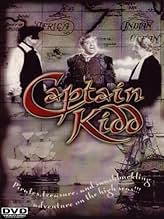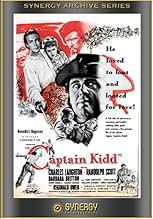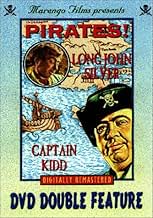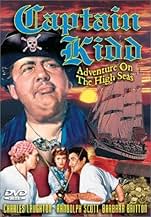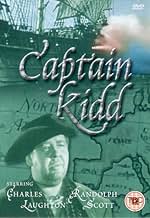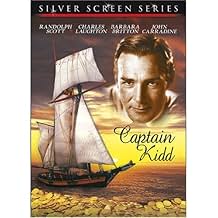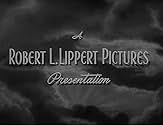IMDb RATING
6.3/10
2.2K
YOUR RATING
The unhistorical adventures of pirate Captain Kidd revolve around treasure and treachery.The unhistorical adventures of pirate Captain Kidd revolve around treasure and treachery.The unhistorical adventures of pirate Captain Kidd revolve around treasure and treachery.
- Director
- Writers
- Stars
- Nominated for 1 Oscar
- 1 nomination total
Abner Biberman
- Theodore Blades
- (uncredited)
Harry Cording
- Newgate Prison Warder
- (uncredited)
Jimmy Dime
- Pirate
- (uncredited)
Lumsden Hare
- Lord Fallsworth
- (uncredited)
Al Hill
- Peter Sharfstone
- (uncredited)
George Huggins
- Pirate
- (uncredited)
- Director
- Writers
- All cast & crew
- Production, box office & more at IMDbPro
Featured reviews
A classic example of a pirate melodrama, this production purports to be based on the life of the historic Captain Kidd (played with campy, eye-waggling mannerisms by Laughton). There are few pirate cliches that don't find their way into Norman Reilly Raine's overwrought script - buried treasures, kidnapped maidens, English nobles masquerading as buccaneers. Much of it is unintentionally silly: It is, for example, impossible to take the hale, beefy, Virginia-twanged Randolph Scott as either an English nobleman or a pirate. Scott claims two friends aboard Kidd's pirate ship, both strangely effete, deferential characters: Another pirate, who acts as Scott's valet, and Kidd's own valet, who spends most of the movie surreptitiously assisting Scott in his scheming against the pirate captain. Kidd's companions, by comparison, are swaggering caricatures, and Kidd spends most of the movie scheming to dispatch them in one of the film's strangest images: Laughton, huddled over a small book, jotting down names or crossing them out, muttering to himself and cackling.
Much of this is good fun, and some of the cinematography is gorgeous - even by today's standards, the use of miniatures and trick camerawork creates a convincing illusion of ships at battle on roiling seas. But the story is so far from history that there seems to be no good reason to name Laughton after the real Captain Kidd, a bumbler whose short career as a pirate and humiliating death was little but a series of bizarre travesties. But the script is awkward and choppy, and many of the set pieces are strangely cramped and stagey, as though this were a theatrical production rather than a film. Ultimately, the true pleasure in watching the film comes from Laughton's peculiar performance, which is similarly theatrical, as though it were an oversized clown act from a London stage transferred to film. He plays Kidd without nuance, telegraphng the captain's bloated greed and amorality as though these were comical personal eccentricities. The closest the screen has since produced to Laughton's outre characterization is Harvey Fierstein's Pirate King character in 1997's Kull the Conqueror, which is pure camp.
Laughton was, in fact, gay, and though this fact is never made overt in Captain Kidd, there is some surprising subtext. Two scenes in particular strike contemporary eyes as having implicitly camp sensibilities - one in which Laughton sniffingly dismisses any interest in female companionship, and another scene in which Scott, a legitimate beefcake, shares a bath with his valet, both happily scrubbing each other while surrounded by hundreds of semi-clad pirates. Yo ho ho.
Much of this is good fun, and some of the cinematography is gorgeous - even by today's standards, the use of miniatures and trick camerawork creates a convincing illusion of ships at battle on roiling seas. But the story is so far from history that there seems to be no good reason to name Laughton after the real Captain Kidd, a bumbler whose short career as a pirate and humiliating death was little but a series of bizarre travesties. But the script is awkward and choppy, and many of the set pieces are strangely cramped and stagey, as though this were a theatrical production rather than a film. Ultimately, the true pleasure in watching the film comes from Laughton's peculiar performance, which is similarly theatrical, as though it were an oversized clown act from a London stage transferred to film. He plays Kidd without nuance, telegraphng the captain's bloated greed and amorality as though these were comical personal eccentricities. The closest the screen has since produced to Laughton's outre characterization is Harvey Fierstein's Pirate King character in 1997's Kull the Conqueror, which is pure camp.
Laughton was, in fact, gay, and though this fact is never made overt in Captain Kidd, there is some surprising subtext. Two scenes in particular strike contemporary eyes as having implicitly camp sensibilities - one in which Laughton sniffingly dismisses any interest in female companionship, and another scene in which Scott, a legitimate beefcake, shares a bath with his valet, both happily scrubbing each other while surrounded by hundreds of semi-clad pirates. Yo ho ho.
Like THE SON OF MONTE CRISTO (1940), this public-domain title turned up on local TV some years ago; the film starts off well enough and is enjoyable in itself, but peters out towards the end. Charles Laughton (who reprised the role in ABBOTT AND COSTELLO MEET CAPTAIN KIDD [1952]) is certainly fun as the title villain, and it was especially gratifying to watch him interact with John Carradine; the great cast features innumerable other familiar faces, though Randolph Scott seems positively ill-at-ease in pirate garb (especially after having just watched him in one of his defining western roles by way of Budd Boetticher's SEVEN MEN FROM NOW [1956])! The low-budget is evident in the film's studio-bound look (despite being mostly ship-set!), its use of stock footage (particularly in establishing shots) and the conspicuous stunt doubles during the duel scene between Scott and Gilbert Roland.
Ahoy, mateys! 1945's Captain Kidd is a small gem of a swashbuckler with Charles Laughton, all menacing pudginess, spastic hair, and bad table manners, as the roguish pirate masquerading as a legitimate British sea captain. He and his dwindling posse of baddies (Guess who's causing them to dwindle!) are aiming to hijack a British freighter out of In-Jah, scoop up some loot already buried, have their way with a proper English lady, and whack Randolph Scott, the only man who can reveal their perfidy.
It's all so much yo-ho-ho and the actors seem to be having one heck of a good time. The only problem with the film is that, for 1945, the production values are so poor and the film is so murky that the whole thing looks like it's ten years older.
Find a copy of it in the dollar DVD dumpster at Wal-Mart and have a great time with Laughton chewing (with his mouth open) the scenery and Randolph Scott looking handsome in a series of sailor suits.
It's all so much yo-ho-ho and the actors seem to be having one heck of a good time. The only problem with the film is that, for 1945, the production values are so poor and the film is so murky that the whole thing looks like it's ten years older.
Find a copy of it in the dollar DVD dumpster at Wal-Mart and have a great time with Laughton chewing (with his mouth open) the scenery and Randolph Scott looking handsome in a series of sailor suits.
This film is a fictional story of a real man in history: Captain William Kidd. The real Captain Kidd lived from c. 22 January 1645 – 23 May 1701 (death by hanging for piracy) but that is another story.
Captain Kidd (1945) is a worthy sea adventure - a pretty good drama. Great casting lead by Charles Laughton as William Kidd, supported by John Carradine as Orange Povey, Randolph Scott as Adam Mercy & Barbara Britton as Lady Anne Dunstan.
The film is what you would expect from a film of this nature: gold, swashbuckling fight scenes, sunken ships, back-stabbing, treachery, stormy seas, stealing -- just an all around fun adventure film.
8/10
Captain Kidd (1945) is a worthy sea adventure - a pretty good drama. Great casting lead by Charles Laughton as William Kidd, supported by John Carradine as Orange Povey, Randolph Scott as Adam Mercy & Barbara Britton as Lady Anne Dunstan.
The film is what you would expect from a film of this nature: gold, swashbuckling fight scenes, sunken ships, back-stabbing, treachery, stormy seas, stealing -- just an all around fun adventure film.
8/10
Anyone who's thinking that they will get the story of Captain William Kidd is in for one disappointing viewing. This is not the story of the real William Kidd who in fact some say, may not even have been a pirate, merely a British privateer. There's some controversy raging to this day about whether he left some buried treasure in and around the New York City area. In fact colonial New York is where the captain's base of operations was, though New York gets the barest mention in the beginning of the film.
This version of Kidd has him as a cockney with a burning ambition to rise in class. Actually Kidd was born in Scotland in either Aberdeen or Dundee depending on what source you use. He's a clever rogue, after sinking a king's ship and then accusing that noble captain of piracy.
Giving that story to King William III of Orange, Kidd gets a ship and he picks a crew of cutthroats and sets sail to do more plunder.
Captain Kidd suffers from two faults mainly. It's badly edited, the film clearly begins at a point where some previous action took place explaining some of what we see. Probably something of New York where Kidd began his career. A whole lot of things are left up in the air because of this. Secondly, Randolph Scott is horribly miscast in a part that Errol Flynn or Tyrone Power or Douglas Fairbanks, Jr. should have played. My guess is that none of these gentlemen could be secured for a loan out from their studios. Even Cornel Wilde or Louis Hayward would have been better.
But what enjoyment you get in the film comes from Charles Laughton's florid performance as Captain Kidd. Basically what he's done is taken his Horace Prin character from White Woman and set him to sea. Laughton's overacting is nicely counterbalanced by Reginald Owen as a valet he's hired and takes to sea to teach him the fine art of being a gentleman. Laughton overacts outrageously, but I'm sure he realized that without it, the film would have been dull as dishwater.
Gilbert Roland, John Carradine, and Sheldon Leonard are all part of Laughton's gang of thieves. Barbara Britton looks properly demure as a heroine caught up among them. And Henry Daniell, the man with the built in sneer in his voice, for once plays a good guy as King William.
Charles Laughton fans will love Captain Kidd. And Laughton was even more outrageous when he reprised Captain Kidd when he met up with Abbott and Costello. But that's a whole other movie.
This version of Kidd has him as a cockney with a burning ambition to rise in class. Actually Kidd was born in Scotland in either Aberdeen or Dundee depending on what source you use. He's a clever rogue, after sinking a king's ship and then accusing that noble captain of piracy.
Giving that story to King William III of Orange, Kidd gets a ship and he picks a crew of cutthroats and sets sail to do more plunder.
Captain Kidd suffers from two faults mainly. It's badly edited, the film clearly begins at a point where some previous action took place explaining some of what we see. Probably something of New York where Kidd began his career. A whole lot of things are left up in the air because of this. Secondly, Randolph Scott is horribly miscast in a part that Errol Flynn or Tyrone Power or Douglas Fairbanks, Jr. should have played. My guess is that none of these gentlemen could be secured for a loan out from their studios. Even Cornel Wilde or Louis Hayward would have been better.
But what enjoyment you get in the film comes from Charles Laughton's florid performance as Captain Kidd. Basically what he's done is taken his Horace Prin character from White Woman and set him to sea. Laughton's overacting is nicely counterbalanced by Reginald Owen as a valet he's hired and takes to sea to teach him the fine art of being a gentleman. Laughton overacts outrageously, but I'm sure he realized that without it, the film would have been dull as dishwater.
Gilbert Roland, John Carradine, and Sheldon Leonard are all part of Laughton's gang of thieves. Barbara Britton looks properly demure as a heroine caught up among them. And Henry Daniell, the man with the built in sneer in his voice, for once plays a good guy as King William.
Charles Laughton fans will love Captain Kidd. And Laughton was even more outrageous when he reprised Captain Kidd when he met up with Abbott and Costello. But that's a whole other movie.
Did you know
- TriviaCharles Laughton reprised his role as Captain Kidd in Les joyeux pirates (1952).
- GoofsSailors (who were unlikely to wear shoes on ships anyway) would never wear shoes into a powder magazine. The chances of a spark from boot/ shoe nails amid all that powder was too great.
- Quotes
Orange Povey: You cold-gutted shark.
Capt. William Kidd: Ahh!... You're a flatterer. You've no idea how gratifying it is to have a congenial soul to confide in.
- Alternate versionsThe Roan Group DVD version, which comes from an excellent print, is sadly missing one of the best scenes in the film. In the scene Charles Laughton has trouble dressing for dinner on the ship, he is chastised for his hair-do by his valet, and then gets confused with his manners during dinner. We also learn a little more about Randolph Scott's character in this delightful scene. It can be found on the Australian VHS release from Force Video.
- ConnectionsFeatured in Sprockets: Masters of Menace (1995)
- SoundtracksRule Britannia
(uncredited)
Lyrics by James Thomson
Music by Thomas Augustine Arne
Heard when toasting the merchant ship and when the ships meet on the sea
- How long is Captain Kidd?Powered by Alexa
Details
- Release date
- Country of origin
- Language
- Also known as
- Captain Kidd
- Filming locations
- General Service Studios - 1040 N. Las Palmas, Hollywood, Los Angeles, California, USA(miniature 1695 London dock)
- Production company
- See more company credits at IMDbPro
Box office
- Budget
- $1,500,000 (estimated)
- Runtime1 hour 30 minutes
- Color
- Aspect ratio
- 1.37 : 1
Contribute to this page
Suggest an edit or add missing content


